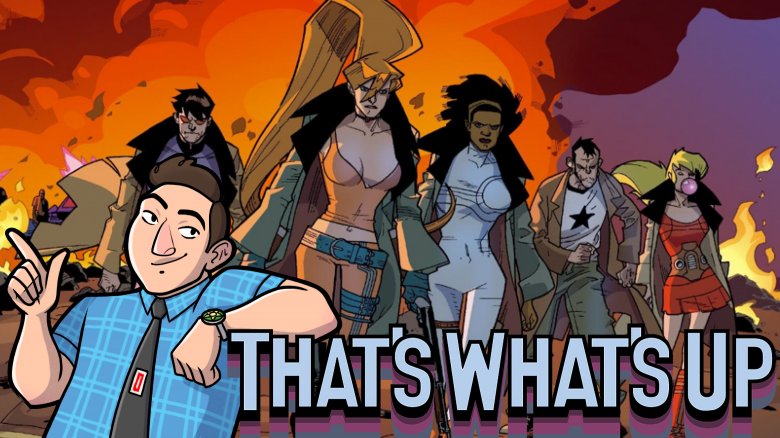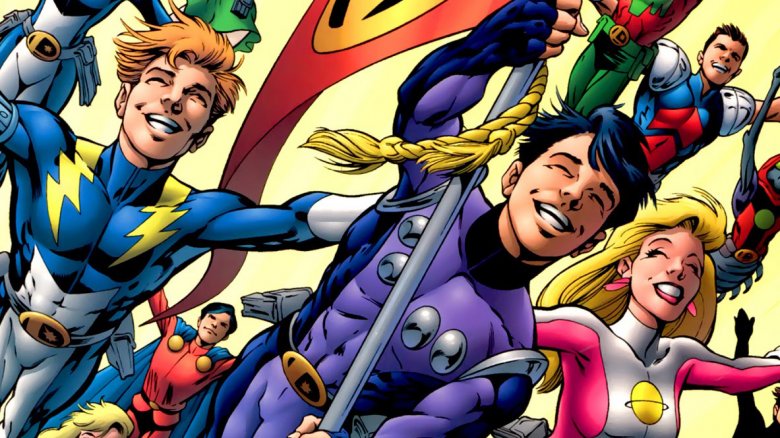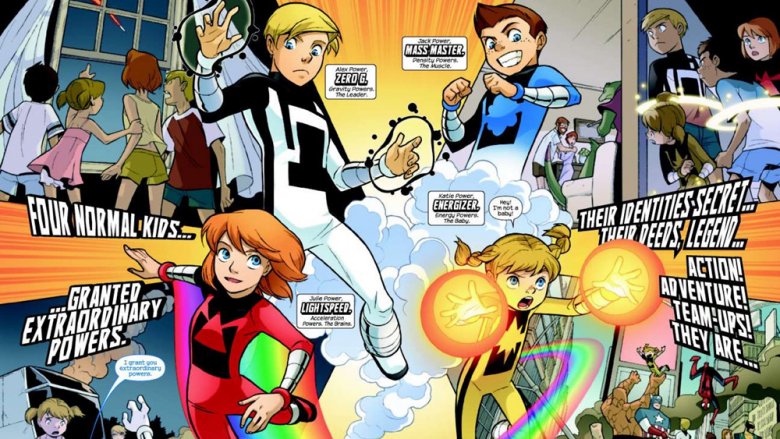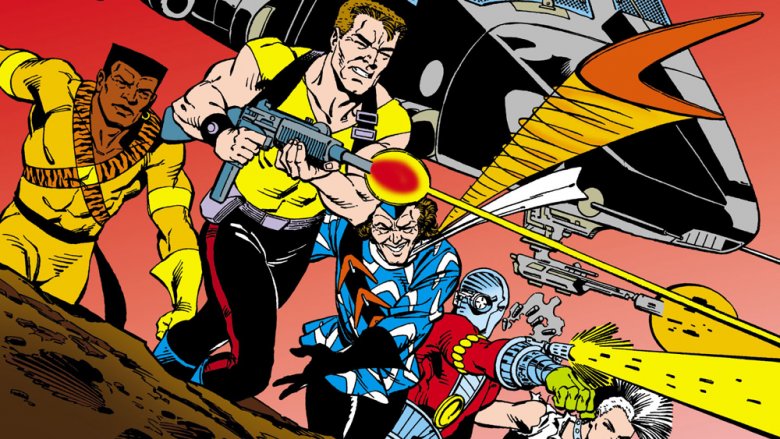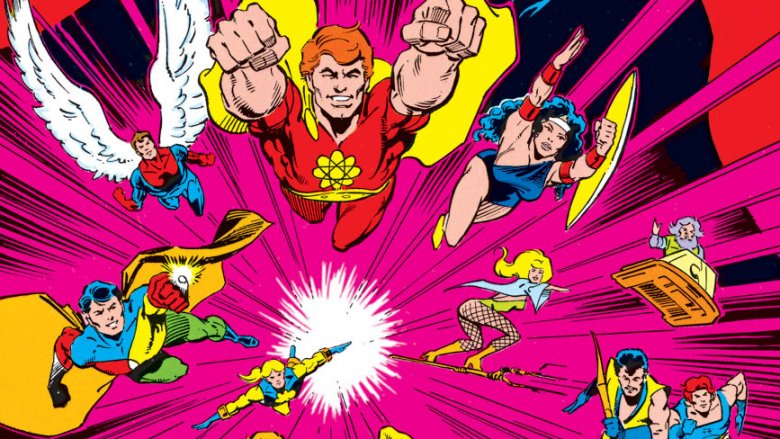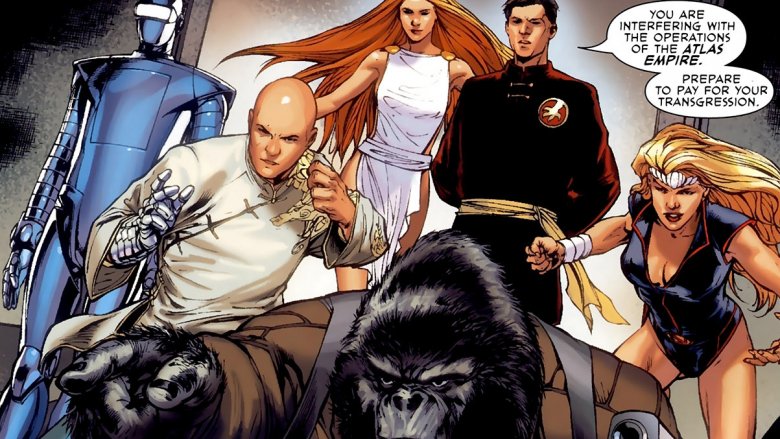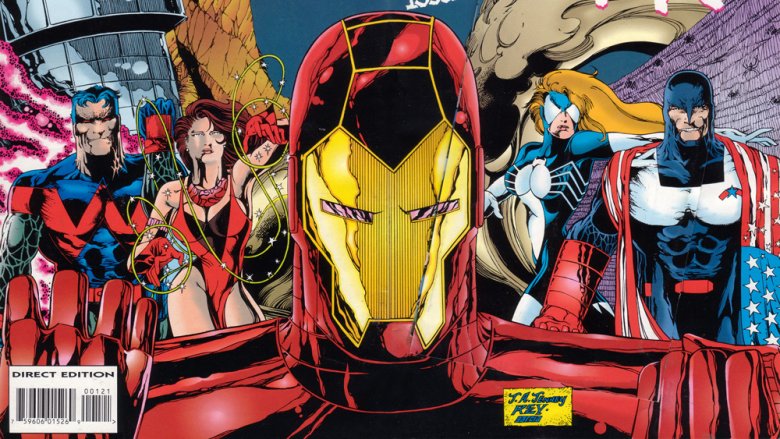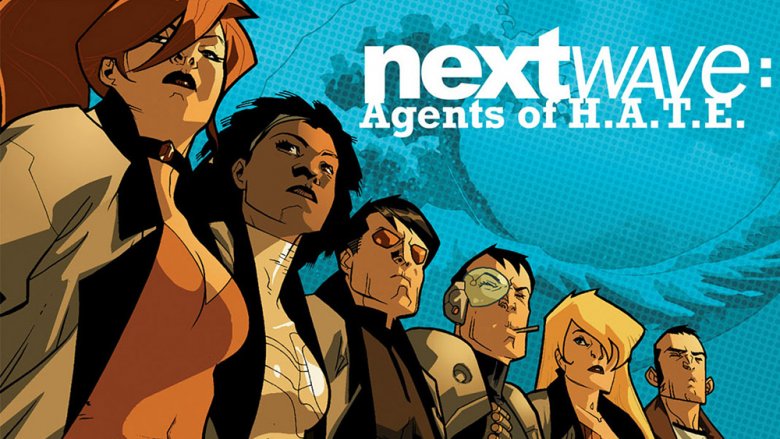That's What's Up: 7 Superhero Teams That Should Be On TV
Each week, comic book writer Chris Sims answers the burning questions you have about the world of comics and pop culture: what's up with that? If you'd like to ask Chris a question, please send it to @theisb on Twitter with the hashtag #WhatsUpChris, or email it to staff@looper.com with the subject line "That's What's Up."
Q: With Doom Patrol coming out, what other superhero teams should get a shot at being made into TV shows? — @Willis_P
This is by no means a complaint, but friends, we are living in an absolutely bonkers era for superhero media. I mean, it's one thing that the single biggest movie franchise in the world features Rocket Raccoon in a heartbreaking dramatic role — and is technically composed of about 20 sequels to an Iron Man movie directed by the guy who made Elf — but that's just the tip of the iceberg. Television, and its cool skateboarding teen cousin we call streaming services, is full of superheroes, and even when they're nominally about a solo character, a team inevitably ends up forming around them.
And really, that makes sense, even if it leads to stuff like TV shows starring Vibe and Killer Frost. Superhero teams, when they're done well, have a variety of interesting visuals and an ensemble cast where the work of building a compelling dynamic is already done. Now that we've got shows about the Titans, the Doom Patrol, a bunch of random X-Men, the Gotham City Police Department, and a team of C-list DC heroes who are so weird that their season finale actually involved a demon from hell fighting a 12-foot tall Care Bear, there's no limits on what might happen next. If I had to pick, though, here's who I'd go with.
The Legion of Super-Heroes
We might as well start with the easiest one, and I'll admit that this is a bit of a cheat. The Legion has actually made a few television appearances, including a relatively short-lived animated series and several episodes of live-action shows like Smallville and, more recently, some pretty prominent roles on Supergirl. That's the problem, though — they're always seen in the context of someone else's story.
Of course, that's kind of how it works in the comics, too — the Legion was originally introduced in 1958 as supporting characters in a Superboy story, a group of oddballs from a thousand years in the future who went back in time to play an elaborate and extremely cruel practical joke on their hero when he was a teen. Since then, they've usually been depicted as a loose offshoot of the Superman family. That's fine, but I've always liked the '90s version that was inspired by the heroics of the 21st century, but had its own thing going on.
Besides that complicated future history, though, the thing the Legion has going for them is that, well, they're a legion. There's a ton of Legionnaires, all with highly specific and occasionally highly weird powers. If a LoSH show leaned hard into the inherent sci-fi weirdness of its premise, just think about all the bizarre, third-season-of-Next-Generation adventures they could get up to playing off a rotating cast that large. Like, everyone knows about Matter-Eater Lad (a lad who eats matter), Bouncing Boy (a boy who bounces), and Triplicate Girl (a girl who is three girls), but what about Infectious Lass, who can afflict anyone with any disease imaginable, or Calamity King, who can make things go disastrously wrong? Imagine what you could do just with Ultra Boy, who has the greatest idea for powers in superhero comic history — he has all of Superman's powers, but he can only use one at a time!
There's just so much to work with, especially when you throw in their equally bizarre villains (I could write for hours about Nemesis Kid), and their connection to people like Darkseid and the far-future legacies of Superman and Batman. We're already living in a world where people care a whole lot about Loki; it's not that much of a stretch to get to one where people are really into Kent Shakespeare.
The Power Pack
Power Pack might just be the most underused Marvel Comics franchise in the history of the company, if only because it's the easiest idea in the world to sell to a large audience. Created in 1984 by Louise Simonson and June Brigman — who, incidentally, is currently the artist of the weirdly addictive soap opera comic strip Mary Worth — it's a comic about four siblings who get super-powers from a dying alien, and have to keep their secret from their parents while also using them to save the world.
It's got superhero stuff mixed with sci-fi and a little bit of high fantasy mixed in — the alien they get their powers from is a straight-up talking horse in a spacesuit named Aelfyre Whitemane, which is the most Dragonriders of Pern stuff I've ever heard — and as a result, you can take it in a lot of directions. If you haven't read it, the original series is probably a little bit darker than you might expect from a comic about kids with magic space unicorn powers, reflecting the fears of the '80s by incorporating stories about drug use and stranger danger. In the 2000s, though, it was relaunched as a full-on kids' comic with plenty of comedy and team-ups with Thor, Spider-Man, Iron Man, and more. That version never teamed up with the Punisher, though — that actually happened in the regular, in-continuity book, and ends with Katie Power convincing Frank Castle to give a criminal a spanking instead of shooting him in the face. No, really. Power Pack #46. Look it up.
Anyway, that kind of versatility means you can do pretty much anything with them. Marvel's had vague plans for a Power Pack movie for the better part of this century, but doing it as a longer-form TV show could really work. Power Pack could lean into the comedy and family dynamics, do a contemporary drama that could work along the same lines as Hulu's Runaways, or even take the original's aesthetic and do a period piece along the lines of Stranger Things for the Marvel Universe.
Suicide Squad
Okay, look, before you say anything, I am well aware that there is a Suicide Squad movie franchise. Here's the problem, though: it is not very good, and part of that is the way that it's constructed.
The entire reason for John Ostrander, Kim Yale, and Luke McDonnell's '80s Suicide Squad comic — the idea on which the movie is ostensibly based — was that after merging all of their various universes and acquisitions together in 1987 and focusing on stories that would be a little more serious than what they'd been doing for the past '50 years, DC had a bunch of obscure supervillains that nobody really wanted to use anymore. Oddballs like Captain Boomerang, Punch and Jewelee, and Count Vertigo were no longer cool, which made them expendable in both a literal and narrative sense. Thus, all those disused pieces of the unified DC Universe were dusted off and put into a book where the entire cast could be killed off — and at least one of them died in every story arc.
The movie, on the other hand, gives us this weird setup where we have all these "villains" that we've never actually seen before, which means that 1) we're looking at a universe where Batman fought Killer Croc and Deadshot and the Joker and we never got to see any of it, and 2) there can't be any redemptive narrative arc for a character like Deadshot, who went from obscure one-note villain-of-the-week to one of the most compelling characters in comics in the span of 60 issues.
The thing is, we're now at the point with superhero television where we could actually use that original concept. Over the course of its five seasons, the CW's Flash alone has introduced dozens of villains that are exactly the kind of losers that the '80s Squad did so much with. Like, Rainbow Raider exists in that universe. Trickster's there. Magenta. Plastique. Deathbolt. Heck, we already know that Captain Cold is the single best character in that universe, so why not throw them all together and see what happens? And hey, if calling them the Suicide Squad is a problem, just do what DC did in 2006 and relaunch the same idea under the title Secret Six.
The Squadron Supreme
I've got a lot of hot takes when it comes to superheroes, but the hottest by far is this: in terms of stories about superheroes attempting to change the world and dealing with "realistic" consequences of their actions and flaws, Mark Gruenwald and Bob Hall's Squadron Supreme is every bit as good as Watchmen, and the only reason people don't know that is that Watchmen has been continuously in print since 1987, and Squadron Supreme hasn't.
I have to admit that I'm both contrary by nature and a huge fan of Gruenwald in general, but I'll stand by that opinion, and if nothing else, more people should be reading this book. Gruenwald was legendarily a lifelong DC Comics fan who spent the entirety of his career working at Marvel, and in 1984, he got to put those two aspects of comics together by doing a 12-issue miniseries about Marvel's serial-numbers-filed-off versions of the Justice League. The idea here is that some eerily familiar characters — like a solar-powered lowercase-s superman, a billionaire with no super-powers who dresses as a flying creature, and a lowercase-a amazon warrior from a mythical, isolated island — decide to go beyond just fighting crime and attempt to turn their world into a genuine utopia. It goes really well! For like two whole issues!
With superhero media being as prominent as it is, we've finally gotten to the point where things like movies and television shows can begin commenting on the genre conventions and archetypes, and Squadron Supreme provides a great blueprint on how to do that. It's smart and well-crafted, but nowhere near as cynical as Watchmen, giving it a vastly different feel than most meta-commentary. And honestly, if Watchmen can get a movie and a TV show, then Squadron can at least get a single season on Netflix or something, right?
Agents of Atlas
While we're on the subject of Marvel teams that are way more obscure than they should be, let's talk about Agents of Atlas, one of the best team books that company has ever published. It actually has its roots in an issue of What If (#9, if you're curious) about what would've happened if the Avengers were formed in the '50s. Rather than heroes like Iron Man and Thor, who made their debuts in the early '60s, the "50s Avengers" team was made up of characters from Marvel's hazy, pre-Fantastic Four era.
In 2006, the idea worked its way into regular continuity as the Agents of Atlas, with "Atlas" being a reference to the name that Marvel operated under before they were "Marvel." The team was made up of Venus (the goddess of love who was later revealed to be a siren), M-51 the Human Robot (who was really just a robot), the original Marvel Boy from the '40s, Namora (Namor's cousin), and Gorilla Man (a gorilla, man), all led by a S.H.I.E.L.D. agent named Jimmy Woo. They were tasked with dismantling the criminal empire of a pulp villain called the Golden Claw, with the twist being that the Claw, who had been Woo's arch-nemesis, was grooming him to take his place as the leader of his organization, Atlas.
The twist to the twist, of course, is that Woo and his team end up trying to use this vast criminal empire and its resources to do good, while still appearing to other superheroes as though they're the same kind of world-conquest group as Hydra or A.I.M. Again, that leads to a lot of different directions you could take the team. The plot of Agents of Atlas already lends itself to that episodic, adventure-show structure, and given how fun Agent Carter was (and how fun Captain Marvel looks like it's going to be), I'd love to see more superhero stuff done as a period piece.
Force Works
I always joke about how we've got superhero movies with talking trees, genetically modified raccoons, and the Grandmaster's space gladiator arena and everyone still takes them very seriously, but the truth is that I honestly don't think superhero movies are weird enough. Don't get me wrong, they're definitely getting there, but there's a certain kind of wild, relentless action movie style that they lack. Stuff like Crank, or Furious 7, that kind of just flat-out ridiculous energy. Comics do it very well in their own way, but we haven't really seen it in live action, outside of Deadpool. If we wind up getting more of that, I think reviving Force Works would be a pretty great way to do it.
As the only comic where the name of the team is also a complete sentence, Force Works was Tony Stark's x-treme '90s group devoted to what the first issue called "an aggressive policy of defense and security," which mostly meant blowing things up until their problems went away. Over the course of its relatively short lifespan, the team would revolve around Iron Man, War Machine, Spider-Woman, Scarlet Witch, and a few lesser-known characters with names like Cybermancer.
Forget the specifics, though. Lift the name and the idea, give the team to War Machine, and have them be the kind of explosion-based superheroes that you'd expect to be led by a guy named "War Machine." It's time we get weird with this stuff. Then again, if we really want to get weird, there's one other team that does that a whole lot better.
Nextwave: Agents of H.A.T.E.
Finally, we have this, and folks, Nextwave should be a TV show. Nextwave should also be a film franchise, a breakfast cereal, and a line of moderately priced shoes. Nextwave should be everything, because Nextwave is the best.
The idea for this one was weirdly similar to the origins of Suicide Squad. Warren Ellis and Stuart Immonen took a bunch of Marvel Universe c-listers — including Machine Man, former Captain Marvel Monica Rambeau, Boom-Boom from the New Mutants, and Elsa Bloodstone, who was originally created as a straight-up Buffy the Vampire Slayer knockoff but was reimagined into a ruthlessly violent monster hunter in the best possible way — and threw them together against plots that were completely off-the-walls nuts. It turned out that they were recruited by H.A.T.E., a terrorist organization masquerading as a government agency, which was actually a branch of the Beyond Corporation, a multinational conglomerate that wanted to take over the world. The team was sent to deal with the Beyond Corporation's goof-ups, including broccoli-men and an invasion by skateboarding Mindless Ones from Dormammu's Dark Dimension, and then took on Beyond themselves and eventually discovered that it was run by a superintelligent T-Rex from dinosaur times.
If that sounds weird, that's because it is, but Legion is pretty weird too, and Nextwave doesn't even ask you to be interested in the Shadow King. There's a beautiful purity to it that represents a part of the superhero genre that I don't think has been adequately explored by superhero media outside of comics, and I think that's the next step. Imagine that playing out in weekly episodes, or being dropped all at once onto a streaming service for people to overload their brains watching it all at once. Think about it: the two best superhero movies of last year were arguably the satire of superhero films, in which Robin and his friends Big Wheeled back in time to make sure Thomas and Martha Wayne got shot, and the one about multi-dimensional Spiders-People trying to stop the Kingpin from leveling Manhattan with a supercollider. This is where we're headed. I just want to get there now.
Each week, comic book writer Chris Sims answers the burning questions you have about the world of comics and pop culture: what's up with that? If you'd like to ask Chris a question, please send it to @theisb on Twitter with the hashtag #WhatsUpChris, or email it to staff@looper.com with the subject line "That's What's Up."
